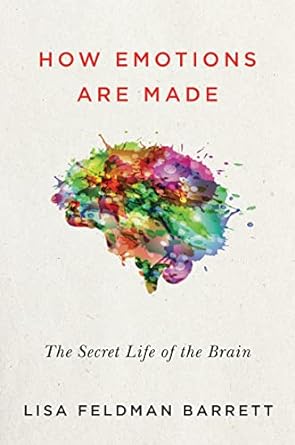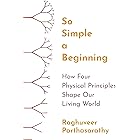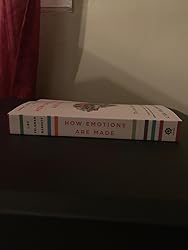| Print List Price: | $19.99 |
| Kindle Price: | $11.49 Save $8.50 (43%) |
| Sold by: | HarperCollins Publishers Price set by seller. |
Your Memberships & Subscriptions

Download the free Kindle app and start reading Kindle books instantly on your smartphone, tablet, or computer - no Kindle device required.
Read instantly on your browser with Kindle for Web.
Using your mobile phone camera - scan the code below and download the Kindle app.

Image Unavailable
Color:
-

-
-
- To view this video download Flash Player
-

-
 VIDEO
VIDEO -

 Audible sample Sample
Audible sample Sample 


Follow the author
OK
How Emotions Are Made: The Secret Life of the Brain Kindle Edition
“A singular book, remarkable for the freshness of its ideas and the boldness and clarity with which they are presented.” — Scientific American
“A brilliant and original book on the science of emotion, by the deepest thinker about this topic since Darwin.” — Daniel Gilbert, best-selling author of Stumbling on Happiness
The science of emotion is in the midst of a revolution on par with the discovery of relativity in physics and natural selection in biology. Leading the charge is psychologist and neuroscientist Lisa Feldman Barrett, whose research overturns the long-standing belief that emotions are automatic, universal, and hardwired in different brain regions. Instead, Barrett shows, we construct each instance of emotion through a unique interplay of brain, body, and culture. A lucid report from the cutting edge of emotion science, How Emotions Are Made reveals the profound real-world consequences of this breakthrough for everything from neuroscience and medicine to the legal system and even national security, laying bare the immense implications of our latest and most intimate scientific revolution.
“Mind-blowing.” — Elle
“Chock-full of startling, science-backed findings . . . An entertaining and engaging read. ” — Forbes
- LanguageEnglish
- PublisherMariner Books
- Publication dateMarch 7, 2017
- File size21472 KB
Customers who bought this item also bought
Get to know this book
What's it about?
This book reveals how the brain constructs emotions, which could revolutionize psychology, health care, the legal system, and our understanding of the human mind.
Popular highlight
An emotion is your brain’s creation of what your bodily sensations mean, in relation to what is going on around you in the world.3,580 Kindle readers highlighted this
Popular highlight
In every waking moment, your brain uses past experience, organized as concepts, to guide your actions and give your sensations meaning. When the concepts involved are emotion concepts, your brain constructs instances of emotion.3,085 Kindle readers highlighted this
Popular highlight
Scientific evidence shows that what we see, hear, touch, taste, and smell are largely simulations of the world, not reactions to it.2,979 Kindle readers highlighted this
Popular highlight
In short, you feel what your brain believes. Affect primarily comes from prediction.2,505 Kindle readers highlighted this
Editorial Reviews
Review
—Scientific American
"Chock-full of startling, science-backed findings...an entertaining and engaging read."
—Forbes
"Fascinating...a thought-provoking journey into emotion science."
—The Wall Street Journal
"Fascinating... If you want to read emotions better, read this book."
—Harper’s Bazaar
"I have never seen a book so devoted to understanding the nature of emotions...the book is down-to-earth and a delight to read. With a high level of knowledge and articulate style, Barrett delivers a prime example of modern prose in digestible chunks."
—Seattle Book Review, 5 Stars
"Most of us make our way through the world without thinking a lot about what we bring to our encounters with it. Lisa Feldman Barrett does—and what she has to say about our perceptions and emotions is pretty mind-blowing."
—Elle
"Drawing on neuroscience and experimental psychology to overturn the assumption that emotions are innate and universal, this book describes them as 'goal-based' concepts designed to help us categorize experience...Upbringing has the biggest influence, but we can all reshape our mental makeup and learn new concepts. The latter part of the book considers how doing so can affect our health, the law, and our relationship with the natural world. As Barrett frequently repeats, 'You are an architect of your experience.'"
—The New Yorker, "Briefly Noted"
"A neuroscientist offers an enjoyable guide to a revolutionary scientific theory of emotion and its practical applications."
—Shelf Awareness
"Prepare to have your brain twisted around as psychology professor Barrett takes it on a tour of itself... Her enthusiasm for her topic brightens every amazing fact and theory about where our emotions come from...each chapter is chockablock with startling insights. ...Barrett's figurative selfie of the brain is brilliant."
— Booklist, STARRED
"A well-argued, entertaining disputation of the prevailing view that emotion and reason are at odds...Highly informative, readable, and wide-ranging."
—Kirkus Reviews, STARRED review
"Barrett (psychology, Northeastern Univ.) presents a new neuroscientific explanation of why people are more swayed by feelings than by facts. She offers an unintuitive theory that goes against not only the popular understanding but also that of traditional research: emotions don’t arise; rather, we construct them on the fly. Furthermore, emotions are neither universal nor located in specific brain regions; they vary by culture and result from dynamic neuronal networks. These networks run nonstop simulations, making predictions and correcting them based on the environment rather than reacting to it. Tracing her own journey from the classical view of emotions, Barrett progressively builds her case, writing in a conversational tone and using down-to-earth metaphors, relegating the heaviest neuroscience to an appendix to keep the book accessible. Still, it is a lot to take in if one has not been exposed to these ideas before. VERDICT The theories of emotion and the human brain set forth here are revolutionary and have important implications. For readers interested in psychology and neuroscience as well as those involved in education and policy."
—Library Journal, STARRED review
“This meticulous, well-researched, and deeply thought out book reveals new insights about our emotions—what they are, where they come from, why we have them. For anyone who has struggled to reconcile brain and heart, this book will be a treasure; it explains the science without short-changing the humanism of its topic.”—Andrew Solomon, best-selling author of Far From the Tree and The Noonday Demon
“A brilliant and original book on the science of emotion, by the deepest thinker about this topic since Darwin.”—Daniel Gilbert, best-selling author of Stumbling on Happiness
“Ever wonder where your emotions come from? Lisa Barrett, a world expert in the psychology of emotion, has written the definitive field guide to feelings and the neuroscience behind them.”—Angela Duckworth, best-selling author of Grit
“We all harbor an intuition about emotions: that the way you experience joy, fear or anger happens automatically and is pretty much the same in a Kalahari hunter-gatherer. In this excellent new book, Lisa Barrett draws on contemporary research to offer a radically different picture: that the experience of emotion is highly individualized, neurobiologically idiosyncratic, and inseparable from cognition. This is a provocative, accessible, important book.”—Robert Sapolsky, author of Why Zebras Don't Get Ulcers and A Primate's Memoir
“Everything you thought you knew about what you feel and why you feel it turns out to be stunningly wrong. Lisa Barrett illuminates the fascinating new science of our emotions, offering real-world examples of why it matters in realms as diverse as health, parenting, romantic relationships and national security.”
—Peggy Orenstein, author of Girls & Sex
“After reading How Emotions Are Made, I will never think about emotions the same way again. Lisa Barrett opens up a whole new terrain for fighting gender stereotypes and making better policy.”—Anne-Marie Slaughter, author of Unfinished Business
“What if everything you thought you knew about lust, anger, grief, and joy was wrong? Lisa Barrett is one of the psychology’s wisest and most creative scientists and her theory of constructed emotion is radical and fascinating. Through vivid examples and sharp, clear prose, How Emotions are Made defends a bold new vision of the most central aspects of human nature.” —Paul Bloom, author of Against Empathy and How Pleasure Works
“Lisa Barrett writes with great clarity about how your emotions are not merely about what you're born with, but also about how your brain pieces your feelings together, and how you can contribute to the process. She tells a compelling story.”—Joseph LeDoux, author of Anxious and Synaptic Self
“How Emotions Are Made offers a grand new conception of emotions—what they are, where they come from, and (most importantly) what they aren’t. Brain science is the art of the counterintuitive and Lisa Barrett has a remarkable capacity to make the counterintuitive comprehensible. This book will have you smacking your forehead wondering why it took so long to think this way about the brain.”—Stuart Firestein, author of Failure: Why Science is So Successful and Ignorance: How It Drives Science
“How Emotions Are Made is a provocative, insightful, and engaging analysis of the fascinating ways that our brains create our emotional lives, convincingly linking cutting edge neuroscience studies with everyday emotions. You won't think about emotions in the same way after you read this important book.”—Daniel L. Schacter, author of The Seven Sins of Memory
“Lisa Barrett masterfully integrates discoveries from affective science, neuroscience, social psychology, and philosophy to make sense of the many instances of emotion that you experience and witness each day. How Emotions are Made will help you remake your life, giving you new lenses to see familiar feelings—from anxiety to love—anew.”—Barbara Fredrickson, author of Positivity and Love 2.0
"How Emotions are Made is a tour de force in the quest to understand how we perceive, judge and decide. It lays the groundwork to address many of the mysteries of human behavior. I look forward to how this more accurate view of emotion will help my clients in athletics and trading."
—Denise K. Shull, MA, Founder and CEO of The ReThink Group
"With How Emotions Are Made, Lisa Feldman Barrett has set the terms of debate for emotion theory in the 21st century. In clear, readable prose, she invites us to question both lay and expert understandings of what emotions are—and she musters an impressive body of data to suggest new answers. Barrett’s theory of how we construct emotions has major implications for law, including the myth of dispassionate judging. Her 'affective science manifesto for the legal system' deserves to be taken seriously by theorists and practitioners alike."
—Terry Maroney, Professor of Law and Professor of Medicine, Health and Society, Vanderbilt University
"Every lawyer and judge doing serious criminal trials should read this book. We all grapple with the concepts of free will, emotional impulses, and criminal intent, but here these topics are exposed to a new scrutiny and old assumptions are challenged. The interface of law and brain science is suddenly the area we ought to be debating."
—Baroness Helena Kennedy, QC House of Lords, U.K.
“Extraordinarily well written, Lisa Barrett’s How Emotions are Made chronicles a paradigm shift in the science of emotion. But more than just a chronicle, this book is a brilliant work of translation, translating the new neuroscience of emotion into understandable and readable terms. Since that science has profound implications in areas as disparate as police shootings and TSA profiling, the translation is critical for scientists and citizens, lawmakers and physicians. (For example, what if there is no meaningful scientific difference between premeditated murder, the product of rational thought, which we consider most culpable, and the lesser offense of manslaughter, a 'crime of passion?') Emotions do not reside in dedicated brain areas, constantly at war with areas charged with cognition or perception, as Pixar caricatured it in Inside out, let alone the brain described by Descartes or Plato or other philosophers. Nor does the brain passively retrieve data from “outside” to which it reacts. The brain constructs the reality it perceives, and the emotions it (and we) experience, using core brain systems, not specialized circuits. And it does so in concert with other brains, with the culture surrounding it. The implications of this work ('only' challenging two thousand year old assumptions about the brain) and its ambitions are nothing short of stunning. Even more stunning is how extraordinarily well it succeeds.”—Nancy Gertner, Senior Lecturer on Law, Harvard Law School, and former U.S. federal judge for the United States District Court of Massachusetts
About the Author
Product details
- ASIN : B00QPHURT6
- Publisher : Mariner Books; Illustrated edition (March 7, 2017)
- Publication date : March 7, 2017
- Language : English
- File size : 21472 KB
- Text-to-Speech : Enabled
- Screen Reader : Supported
- Enhanced typesetting : Enabled
- X-Ray : Enabled
- Word Wise : Enabled
- Sticky notes : On Kindle Scribe
- Print length : 449 pages
- Best Sellers Rank: #25,853 in Kindle Store (See Top 100 in Kindle Store)
- Customer Reviews:
About the author

Lisa Feldman Barrett, Ph.D. is among the top 1% most cited scientists in the world for her revolutionary research in psychology and neuroscience. She is a University Distinguished Professor at Northeastern University with appointments at the Massachusetts General Hospital and Harvard Medical School. Dr. Barrett was awarded a Guggenheim fellowship in neuroscience in 2019, and she is a member of the American Academy of Arts and Sciences and the Royal Society of Canada. She lives in Boston. More at LisaFeldmanBarrett.com. Twitter: @LFeldmanBarrett.
Customer reviews
Customer Reviews, including Product Star Ratings help customers to learn more about the product and decide whether it is the right product for them.
To calculate the overall star rating and percentage breakdown by star, we don’t use a simple average. Instead, our system considers things like how recent a review is and if the reviewer bought the item on Amazon. It also analyzed reviews to verify trustworthiness.
Learn more how customers reviews work on AmazonReviews with images
-
Top reviews
Top reviews from the United States
There was a problem filtering reviews right now. Please try again later.
From an academic's perspective, I will examine a few of the major premises of the book.
The biggest and most important thesis of this book is that the human mind constructs emotions via what she terms "predictions" and "affect." Barrett defines predictions (or concepts) in a similar way to previous theorists who call these ideas "schema or schemata." Her definition includes a very simple use that is similar to the colloquial term, or basically a concept or an idea of what we think will happen informed on what has happened to us in the past. Simple enough and very easy to understand. Affect, by her account, is the brain's ability to interpret signals coming in from the various parts of the body and t turn it into something meaningful for us. According to her, the brain is not very good at interpreting these signals at times, and our methods of interpretation come by way of external teaching rather than internal methods of defining them. She says that this is what separates the average person from those with Autism Spectrum Disorder; that they have not successfully incorporated these emotional keywords into their lives. All of these assertions are backed up by strong evidence, and by all accounts are consistent with most previous research in the field of cognition. Emotions and predictions or concepts all function in a similar fashion to heuristics, which are shortcuts and best guesses about what the brain things will happen. This is indeed how most people use emotions to function, as a methodology for interpreting how they feel and how others feel.
I have noticed in other reviews some have questioned her evidence of questioning the objectivity of emotional perception, and I think these readers are missing the point. If something is completely arbitrary, as is the case with the social determination of emotions, then there can be no objective method for determining what someone is feeling. Objective, in this sense, is used in a scientific term to mean "Constant regardless of the observer." Typically this definition is applied to mathematical constants of the universe, such as the law of gravity which affects all things at the same rate proportional to mass and acceleration. Emotions do not function in the same way as the laws of physics do objectively, and therefore cannot be considered anything more than subjective; that is reliant on interpretation or our own experiences. With this in mind, her theory is far more comprehensive than any other that I have seen in my career, and is far more down to earth than other decisionmaking theories that tend towards a neat equation-style method of explaining how people work. People work based upon their "emotions" and the majority of people make decisions based on what "feels the best." In this case since Barrett has discovered the methodology by which these people govern their daily lives, there are huge implications for further studies down the road.
On to the part about the applications of this resarch, which I find to be less infromative than the theory part, but that is likely because I'm an academic. In the second half of her book, Barrett uses the information she's discovered to apply it to how you, the reader, can use it to change your behavior and thoughts. You are in control of your emotions, and with some training, you can de-condition yourself from using them as a crutch for everything. Her advice is rather easily summarized as "be more self aware" and "Meditate to relax." To briefly editorialize, it seems unlikely to me that the average person would be able to complete changes like these on their own without the help of a therapist. That is, after all, (and this is something she admits in her book), why people seek the help of therapists in the first place---to reframe issues in a new light. Despite this, barrett does make an attempt to help the reader use this new information, despite how little it will likely mean.
This all sounds quite abstract I am sure. This is a deep book that weaves together a lot of ideas and presents a whole new way of thinking about emotions and our own humanity and consciousness. It starts out by showing some images or faces with expressions and asking the reader what they believe those people are experiencing as emotions. The reader as well as the groups surveyed with the results contained in the book all show very strongly that people see the same emotions in those faces. Interestingly as the surveyed group's culture becomes more removed the overlap does diminish. The author uses this as a starting point to frame the discussion and gives the background of the photos taken, which are from actors hyperbolizing some face. The author goes on to describe how a mind works and discusses it is a pattern recognition machine. The author discusses how the mind creates hierarchical knowledge and how we categorize objects very well. Our ability to distinguish objects into distinct categories has always been a challenging skill to program but this patter recognition is a strong attribute of how our minds work. The author goes on to discuss how emotions do not have a universal character and that a roller coaster and being in an out of control car might create similar physical conditions but totally different emotional characters. The idea that emotion has an independent character from the body the author believes is fundamentally flawed. The author then discusses how the body receives inputs from our environment and responds to best balance the "body budget" and then we frame our understanding of that process via the use of emotional characterizations. The author brings up ideas like emotions don't objectively exist as they represent our internal interpretations of our physiological responses rather than something objective and thus they are constructed from the way we live in a social world. There is much in common with some memetic ideas in this book. In particular that concepts are created and become reality by our use of language rather than have their independent existence. The author gives advice on how to better understand yourself and your emotions and frames the questions we should ask ourselves to improve the way we respond to stimuli. In particular expanding our emotional vocabulary and improving our categorization of emotions allows us to better understand our selves. The author also dedicates space to illness and the mind, examining things like depression and the overmedication in the US. As well the author discusses how diet, sleep, exercise help keep one's body balance in tune, which is the origin of where responses which are then interpreted as emotions come from. The author then tackles the law from a philosophical standpoint, ideas like intent are fundamentally questioned and the author argues that things like crimes of passion are misguided ideas. Finally the author reinforces how emotions are socially constructed ideas with the example of a barking dog. The interpretation of our favorite animals actions as manifestations of their emotional state just doesn't make sense as they don't have essential emotions. They do feel pain and pleasure but that is very different from happiness, sadness, fear, anger. We project how we interpret the physiological responses to certain stimuli as those emotions and it is fundamentally flawed to assume that we can project those on to other people.
How emotions are made is a deep book with a lot of fascinating ideas. A review cannot do the book justice and I suspect it needs to be read multiple times, though I don't plan on re-reading it just yet! It has new ideas for an old field that needs to be rethought with modern imaging technologies. It is bold and illuminating and definitely food for much thought and will cause much introspection I suspect. Excellent book

















